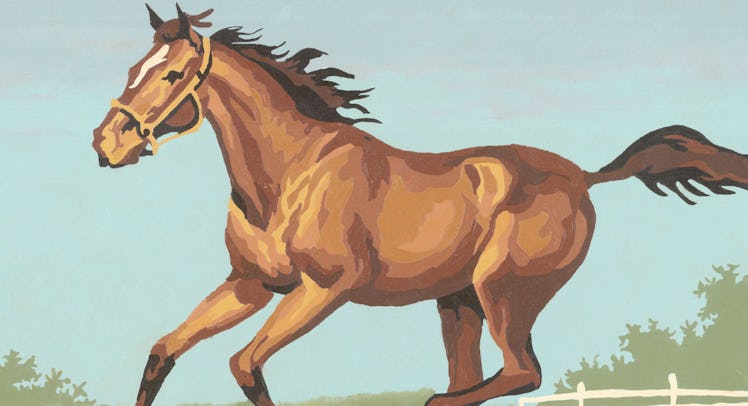Little Girls Love Horses and Ponies Because They Don’t Have Dicks, Freud Says
The father of psychoanalysis would attribute the popularity of My Little Ponies to penis envy.

If Sigmund Freud were alive today, he’d likely attribute the middling box office success of My Little Pony: The Movie to penis envy. According to the father of psychoanalysis, little girls are essentially obsessed with horses because they wish they had dicks. When girls ride horses, they see the horse as a phallic and empowering extension of themselves. It’s not a little pony, it’s a big penis. Weirdly, Freud’s psychoanalyst daughter, who loved to ride, was all in on this theory.
“A little girl’s horse craze betrays either her primitive autoerotic desires (if her enjoyment is confined to the rhythmic movement on the horse); or her identification with the caretaking mother (if she enjoys above all looking after the horse, grooming it, etc.); or her penis envy (if she identifies with the big, powerful animal and treats it as an addition to her body); or her phallic sublimations (if it is her ambition to master the horse, to perform on it, etc.),” Anna Freud wrote in 1926.
But turning innocent equestrian interests into a matter of dicks was not just a family affair. Female scholars such Judith Van Herik of Penn State University, Alanna Stalker-Horner of the University of Iowa, and Edith Kramer of New York University, who founded the field of art therapy, wrote about girls’ disproportionate preoccupation with horses as a way to obtain sexual power and potentially a penis. Today, most experts prefer to point to regular power — horses are big and run fast — to explain children’s love of all things equine. But when Freud proposed his hypothesis, women were just making the transition from riding side-saddle to riding with one leg on each side. The literal horse location combined with the general sexism of the time caused this fascination to become mistakenly (and arguably hilariously) gendered.
“Freud’s theory about girls and horses infuriates nearly every woman rider I know,” Sally Morgan, a holistic physical therapist specializing in animal therapy, told Fatherly. ”Horses represent independence, something young women crave.”
Psychologist Eva Glasrud similarly points out that Freud’s logic is obviously flawed because this childhood interest in riding horse extends to boys and girls who want to explore, take risks, and just get outside and engage in physical activity. “You’re using your body to do something that’s similar to rough-and-tumble play,” Glasrud explained to Fatherly, which has many well-documented developmental benefits for children. “You’re going fast, and you’re exercising independence and autonomy — in fact, you’re actually controlling another being.”
Further research from Ellen Sandseter, a professor of early-childhood education at Queen Maud University College in Norway, found that when kids spend their time exploring outside before age nine, they’re less likely to have anxiety and separation issues as adults. While riding can be risky, Sandseter found that this comes with some reward. Kids who got minor injuries from falling between the ages five and nine were less likely to be afraid of heights as adults.
“Horses are kind of the perfect way to explore and take a risk,” Glasrud says. Simply, girls love horses for the same reasons boys love horses: because they’re good for them.
In the end, the outdated penis envy theory of My Little Pony represents not a phallic obsession of girls, but a phallic obsession of Freud and the same sort of thinking that prompted concerns that bicycles would make women too horny. It was all the result of a lot of people taking any interaction with that region way too literally and it lingered because, until relatively recently, many top-level instructors were men, Morgan says. It was absurd, but also a symptom of a bigger problem of how power is still seen today.
“Power for women has always been considered manly.”
That’s why when girls said they wanted adventure, autonomy, and clout by riding horses, Freud and his followers just heard dongs. But to be fair, if Freud were alive today, he’d probably be a Brony. He’d also be obsessed with unicorns.